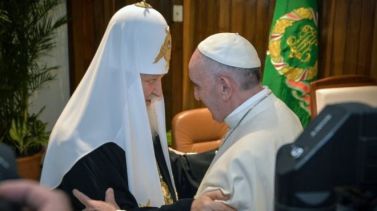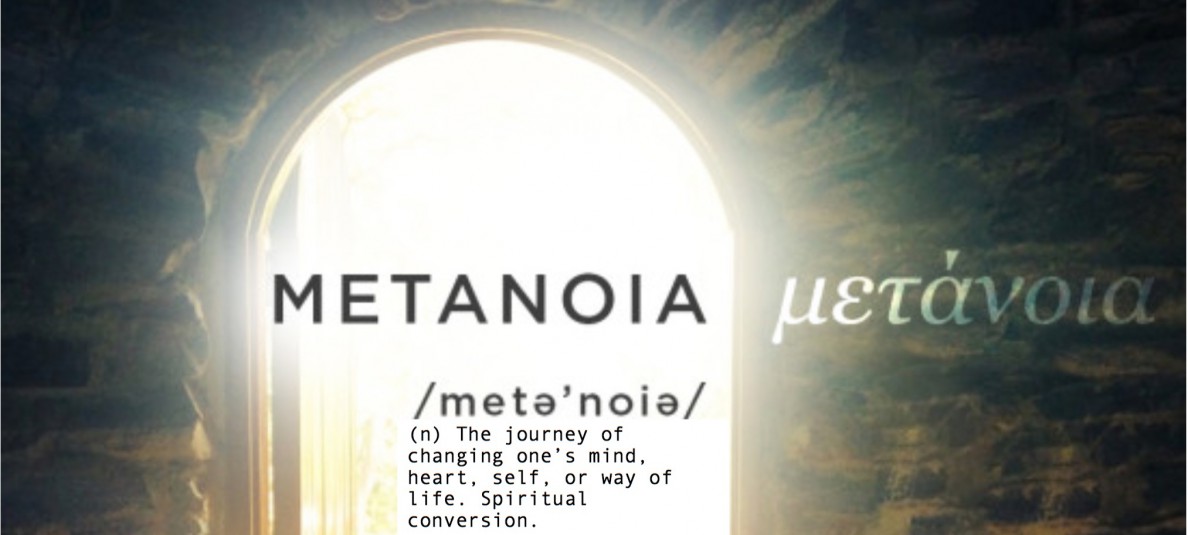Easter 7C: The Toll of Unity
By: Colin Cushman
“Holy Father, watch over them in your name, the name you gave me, that they will be one just as we are one.”
Our lectionary passage this week addresses Christian unity. It is Jesus’ famous prayer that his disciples “may all be one.” Christians throughout the ages have strived for Christian unity as a positive mark of the Church. But how do we make sense of this call for unity? How has it played out in our past, and how should it play out in our present and future?
These questions are complex and multifaceted—and we should keep it that way. Let’s explore the texture of this marvelous complexity by looking at three different vignettes.
* * *
1: A step toward reconciliation
Let’s examine two churches: the Roman Catholic Church and the Russian Orthodox Church. For my fellow Protestants, including myself, most of us (otherwise theologically savvy people) don’t know a thing about why these two churches split. So, here’s a quick refresher:
When the churches finally broke it off in 1054, the East and West had disputed about theology and praxis for at least 200 years. They couldn’t agree on if priests could marry; details about fasting and acceptable iconography; Latin or the vernacular for the Mass; if communion bread should have yeast; which geographical location had primacy; and, most importantly, how the Holy Spirit relates to the rest of the Godhead. However, despite their rhetoric, the fissure occurred mainly because of cultural, political, and economic differences, justified under the veneer of theological dispute.[1]
Back to the modern day: On February 12th of this year, we witnessed a magnificent step  toward bridging this divide. Russian Orthodox Patriarch Kirill of Moscow and All Russia and Pope Francis met in Cuba—the first meeting at this level since the schism occurred. Although they still maintained their theological differences, the persecution of Christians in the Middle East and North Africa ultimately brought them together.
toward bridging this divide. Russian Orthodox Patriarch Kirill of Moscow and All Russia and Pope Francis met in Cuba—the first meeting at this level since the schism occurred. Although they still maintained their theological differences, the persecution of Christians in the Middle East and North Africa ultimately brought them together.
This is perhaps one of the most magnificent examples of Jesus’ prayer for unity that we have in modern history. They explicitly referenced this prayer in their joint declaration:
We are pained by the loss of unity, the outcome of human weakness and of sin, which has occurred despite the priestly prayer of Christ the Saviour: “So that they may all be one…”[2]
They lamented their division and took majors steps to counteract that split. I have no doubt that this event, marked by two magnificent leaders, faithfully embodied what John’s Jesus so fervently desired.
* * *
2: Two stories of racism
Now let us turn to a story that is, in fact, two-in-one:
Frederick Douglass, born into slavery in 1818, ran away and proceeded to become one of the foremost abolitionists in the United States. In My Bondage and My Freedom, Douglass speaks of going to a Methodist Episcopal Church (MEC). When it came time for communion, at first the pastor only allowed the white members to come forward. Douglass recalls,
when it was evident that all the whites had been served with the bread and wine, [the pastor], fully assuring himself on that important point,… beckoned with his hand, exclaiming, ‘Come forward, colored friends!’… I went out, and have never been in that church since.[3]
Douglass eventually ended up at the church of a man named Richard Allen. In 1787, Allen led an exodus of Black churchgoers out of the MEC, protesting the racism they faced. They formed their own denomination, the African Methodist Episcopal Church (AME) that would shelter Blacks from the racial hatred and segregation that they faced in church.
Their detractors undoubtedly leveraged the charge of Christian disunity against them. For, after all, did not Jesus pray that all Christians should be one? By leaving the church, they were directly disobeying Jesus! They were breaking the church into factions, which Paul explicitly railed against in Corinthians!
Yet, I unwaveringly support the decision to break with their denomination. In their cases, the (unified) MEC actively degraded their self worth and human dignity. Their churches taught them that they were not, in fact, fully children of God. In breaking away from that church, they insisted that these messages are not true and that the true God is not like that. Precisely for the sake of being more faithfully Christian, these two men defied the oppressive call for Christian unity. They instead created a refuge where they could truly experience the life and life to the fullest that God brings to humanity.
* * *
3: LGBTQ persons in the United Methodist Church
Let us finally turn to my own denomination, the United Methodist Church, in the modern day. Our denomination is in the midst of massive turmoil, almost entirely stemming from debates about human sexuality. Will we ordain LGBTQ ministers? And will our ministers perform weddings for LGBTQ people? Talk has been swirling about schism.
Recently, many in the conservative wing of the denomination rhetorically leverage ordination vows against those liberals who defiantly perform same-sex marriages. After all, we all took ordination vows to uphold our Book of Discipline, which says that we should not perform these weddings. Therefore, we must be unified in our actions because we all took the same vows.
Most of voices calling for schism are conservative. The liberals largely plead for tolerance and a “big tent” mentality. For the liberals, it is worthwhile to be unified, even if we disagree. This resonates with John’s portrayal of Jesus. Unity is a virtue in and of itself.
How does it change the question, though, when we look at this situation more through the lens of our second vignette, rather than the first? My United Church of Christ (UCC) friends joke about being a refugee church: they will take everybody displaced from their own denominations, often because of sexuality. Even more drastically, Metropolitan Community Church (MCC) explicitly understands itself as denomination comprised of these exiled LBGTQ folks. For these denominations, justice and healing trumps unity. For them, it is not a virtue to stay in a place that continually wounds just to maintain unity. Being safe and developing a healthy image of God is what is most important.
Perhaps then, UMC liberals do have a reason to favor schism. It could make their denomination a place where LGBTQ folks are not collateral damage in a theological war, and where they can fully serve and be served as Christians and as children of God.
* * *
As we consider Christian unity, we must ask: What is the human toll of maintaining this unity? Who disproportionately has to shoulder that burden?
When reading this prayer in John’s gospel, we must consider the tensions between the Christian themes of unity and refuge. This passage does unequivocally show that John favored unity within the nascent Christian church. However, different biblical authors have different theologies than John. Perhaps Luke or James may present a different theology supporting Christian refuge. After all, these are not the only words Jesus said, nor is this the only worthwhile perspective in the Bible. We do indeed have a worthwhile goal in Christian unity—but we cannot advocate it at the expense of the most vulnerable.
[1] So argues Emily Albu in Christianity: A Social and Cultural History (2nd ed.), 188-90.
[2] http://www.news.va/en/news/joint-declaration-of-pope-francis-and-patriarch-ki. 02/12/2016.
[3] http://www.gutenberg.org/files/202/202-h/202-h.htm.

Colin Cushman is with the United Methodist Church, soon moving back home to the Pacific Northwest to serve as a pastor in the Seattle region. His main theological emphasis is on issues of social justice, especially race, human sexuality, and gender. He is an ardent supporter of ecumenism and enjoys exploring the breadth of the Christian tradition. He earned a Master of Divinity from Boston University School of Theology.

Colin,
I really liked your presentation of several different facets of Christian unity. As an ordained pastor in the UCC and a former polity teacher, though, I felt compelled to chime in that the UCC actually sees itself as a “united and uniting” church – we formed out of the union of four separate denominations precisely out of concern that Christians too often split when we should focus on what unites us. This is reflected in our motto – “That they may all be one” – and in the motto of one of our predecessor denominations: “unity in essentials; charity in all else.”
I see congregations like the one I serve, a former MCC church blended with a new church start and made up of people from diverse theological backgrounds, not as an island for wounded refugees but as part of a big tent or a great parade (to borrow former UCC president John Thomas’ phrase) where everyone can find a place. Unity doesn’t have to mean agreeing on everything but instead can mean creating a space where everyone can belong.
LikeLike